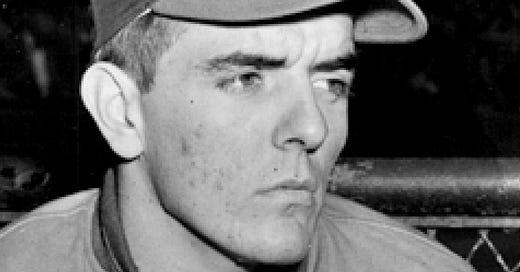Curt Simmons Spectacular Pitching Debut
On September 28, 1947, another young Phillies pitcher had a spectacular debut.
The spectacular debut pitching performance of the Phillies Mick Abel on May 18 immediately brought comparisons to another spectacular debut by a young Phillies pitcher, Curt Simmons. In fact, Abel tied Simmons’ record of nine strikeouts in a Phillies pitching debut. This is the story of Simmons’ own debut almost 78 years ago.
Simmons was a hometown boy, of sorts, having grown up in Egypt, PA, near Allentown, about 70 miles from Philadelphia's Shibe Park. Simmons made his debut with the Phillies on a memorable September Sunday in 1947 at the age of 18, only months out of high school, in a game that kept Phillies fans talking about the youngster’s great potential throughout the long winter.
Simmons debut was eagerly anticipated. He had been the most sought-after pitcher in the country after showing off his blazing fastball in high school and American Legion competition. In 1945 he had been named "All-American Boy" in Philadelphia after pitching in a Legion All-Star game there. Ty Cobb and Babe Ruth, who managed those teams, called him the greatest young ball player they had ever seen. After signing with the Phillies, he was assigned to their affiliate in Wilmington, DE where he took a seventh-place team and pitched them into the playoffs with a 13-5 record, and then won two games in the playoffs, leading them to the league championship. The next day, Simmons was called up to the big club.
A crowd of more than 14,000 showed up on Sunday, September 28, 1947, to see a meaningless double-header on the last day of the season between the seventh placed Phillies and the fourth placed New York Giants. The fans were there to see Simmons, who was scheduled to pitch the second game. Thrust on to the big stage at a very tender age, Curt did not disappoint, dominating the Giants from start to finish, pitching a complete game, and leading the Phils to a 3-1 victory.
Philadelphia Inquirer reporter, Stan Baumgartner enthused that Simmons used "a fastball that was so alive it occasionally squirted out of catcher Andy Seminick's glove and a curve that broke like a jug handle" to keep the slugging Giants at bay. The Giants featured the league leading home run hitter Johnny Mize, who clubbed 51 that year, as well as Bobby Thompson (28) and Willard Marshall (36). None could manage more than a weak single off Simmons, who gave up just five hits (4 singles and a double) and struck out nine. The only blemish on the pitching record for the day came in the ninth inning, when with two outs, two walks and a Buddy Blattner pinch-hit single ruined the shut out. Simmons then finished up in style by retiring the heavy-hitting Mize on a routine ground ball to second base.
When it was all over thousands of youngsters streamed out of the stands like it was the seventh game of the World Series surrounding Simmons and. according to Baumgartner, "practically pushed him along the grandstand to the clubhouse." For his part, young Simmons was modest and composed in speaking about the victory. "I was a bit nervous, always am, before a game. After it started, I just told myself it was just like Wilmington - just another game. And that is really all it was. Andy Seminick did a great job behind the bat for me. He seemed to know just what to call and three times when I broke the curve ball in front of the plate with men on, he made great pickups. The boys fielded well behind me, too. Just tell all my friends in Egypt and all the Phil fans that I am very happy I got such a fine start."
Great talent, great poise, and the ability to talk to the media. Eighteen-year-old Curt Simmons was a rising star indeed.
If Simmons did not quite fulfill all the promise he demonstrated on that distant Sunday afternoon, he certainly became a very fine major league pitcher for a very long time. Over a twenty-year career, often interrupted by military service and injury, Simmons compiled 193 wins. and eventually did get to pitch in the World Series at the age of 35 with the 1964 World Champion St. Louis Cardinals.




Simmons indeed had HOF stuff. Robin Roberts his best friend, said he’d never seen anyone throw harder with more movement than a young Curt Simmons. Stan Musial said was the toughest left hander he faced. He broke more of Stan’s bats than anyone with that fastball that ran in on him. Frank Baumholtz a very good hitter, said Curt was the only pitcher that put some fear into him. Curt was just “wild enough”.
Shoulder and elbow problems kept him from reaching full potential but he was a pro all the way and became a very fine pitcher, even pitching a shutout of the Yankees with the Angels in his twentieth and final season. The Angels offered him a raise to come back for another season but he’d had enough and went home to his family and Philadelphia.